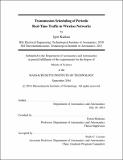Transmission scheduling of periodic real-time traffic in wireless networks
Author(s)
Kadota, Igor
DownloadFull printable version (1.211Mb)
Other Contributors
Massachusetts Institute of Technology. Department of Aeronautics and Astronautics.
Advisor
Eytan Modiano.
Terms of use
Metadata
Show full item recordAbstract
An increasing number of applications rely on wireless networks for distributing information. Communicating time-sensitive data such as position, video, voice and telemetry, can be particularly challenging in wireless networks due to packet losses. In this thesis, we consider a single-hop wireless network, in which a base station is sending time-sensitive data packets to a set of clients. Our goal is to study transmission scheduling strategies for real-time traffic. Even though this problem has been explored in the literature, we present novel results that provide useful insight into the optimal scheduling problem. Previous work considered the problem of maximizing the throughput of networks with instantaneous feedback and without feedback. We address the general case of delayed feedback. Delayed feedback is particularly important for communication systems in which the round trip delay is much greater than the packet transmission time, and it has a significant impact on the scheduling decisions and network performance. In addition, we consider the case of clients receiving multiple parallel packet flows with heterogeneous deadlines. It is a well-known result that the Shortest Time to Extinction (STE) policy optimizes the throughput in wired networks. In this thesis, we establish a class of wireless networks for which the STE policy is throughput-optimal, i.e. minimizes the expected number of packets that expire due to the deadlines. Finally, we study the wireless network from the perspective of the Age of Information (AoI). This recently proposed performance metric represents the freshness of the information at the clients. We use Dynamic Programming to formulate and solve the problem of characterizing the scheduling policy that minimizes the AoI. The AoI metric is compared with throughput, and insights are drawn from numerical results. Simulations suggest that AoI-optimal policies are always throughput-optimal, while the converse is not true.
Description
Thesis: S.M., Massachusetts Institute of Technology, Department of Aeronautics and Astronautics, 2016. This electronic version was submitted by the student author. The certified thesis is available in the Institute Archives and Special Collections. Cataloged from student-submitted PDF version of thesis. Includes bibliographical references (pages [77]-79).
Date issued
2016Department
Massachusetts Institute of Technology. Department of Aeronautics and AstronauticsPublisher
Massachusetts Institute of Technology
Keywords
Aeronautics and Astronautics.